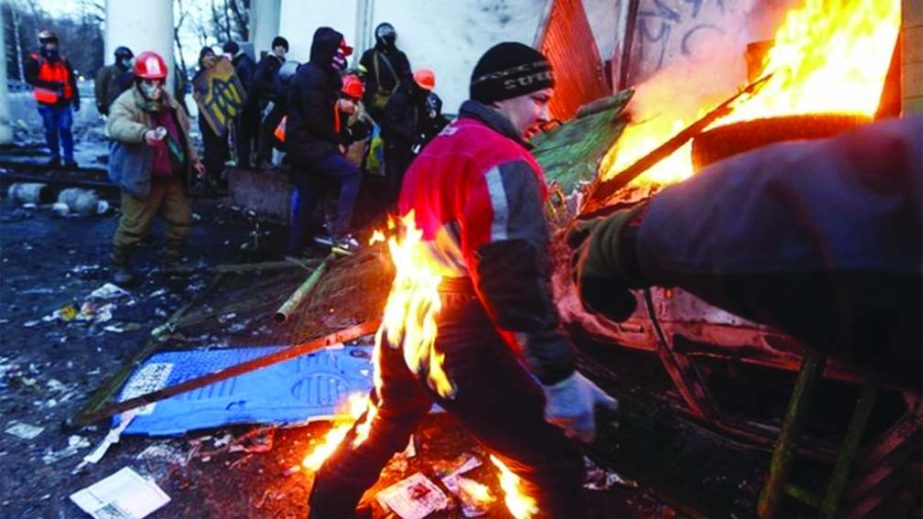
BBC Online :
Violent clashes have continued for a second consecutive night in central Kiev.
Young men threw fireworks and petrol bombs at police guarding the road leading up to the Ukrainian parliament. Police violently beat some of the protesters they captured.
Russia’s Foreign Minister Sergei Lavrov blamed some European politicians for encouraging the protests.
He warned the situation was “getting out of control”.
His words echoed those of President Viktor Yanukovych, who on Monday cautioned that the violence threatened the country’s stability. An array of new anti-protest laws, hastily passed by parliament last week, will come into force on Wednesday.
Protesters have been camped out in Kiev since late November, angered by the government’s turn to Moscow and its rejection of a planned treaty with the EU.
Lines of riot police still held the road leading up to parliament on Tuesday morning, behind burnt-out buses and barricades, reports the BBC’s Daniel Sandford in Kiev.
He says there is a lull in fighting but that many fear the violence will once again erupt later in the day.
Fighting went on through the night, with police using tear gas and stun grenades against several hundred young men ranged against them. At times, thousands of people cheered from the sidelines.
Eighty police have been admitted to hospital following the most recent clashes, says Ukraine’s interior ministry.
It says 32 protesters have been arrested. Thirteen of those held could face up to 15 years in jail for creating “mass disturbances”, local media reported. The violence is in fact restricted to one small zone in central Kiev, close to the main protest encampment at Maidan (or Independence Square), but none of the main political leaders seems able to stop it, our correspondent says.
Two leading opposition figures, former boxing champion Vitali Klitschko and Arseniy Yatsenyuk, have condemned violent protests – which some blame a little-known far-right group, Right Sector, for initiating.
A raft of anti-protest laws passed hastily by parliament last week was published in Golos Ukrainy, a parliamentary newspaper, on Tuesday, and are due to come into force on Wednesday, said reports.
They prescribe jail terms for anyone blockading public buildings, and ban the wearing of masks or helmets at demonstrations.
They also ban any unauthorised tents in public areas and make slandering government officials a crime.
Lavrov blamed some European politicians for “heating up the situation” in Ukraine, though their visits to Maidan square, and their “simply indecent” participation in Ukrainian anti-government protests.
US Assistant Secretary of State Victoria Nuland, European Union foreign policy chief Catherine Ashton and Guido Westerwelle, at the time Germany’s foreign minister, all visited the protesters in December.
Warning that the “situation is getting out of control”, Lavrov added: “We have information that much of this is being stimulated from abroad.”

